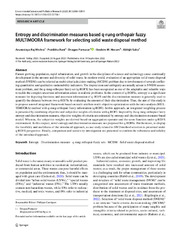Please use this identifier to cite or link to this item:
https://rfos.fon.bg.ac.rs/handle/123456789/2325Full metadata record
| DC Field | Value | Language |
|---|---|---|
| dc.creator | Mishra, Arunodaya Raj | |
| dc.creator | Rani, Pratibha | |
| dc.creator | Pamučar, Dragan | |
| dc.creator | Hezam, Ibrahim M. | |
| dc.creator | Saha, Abhijit | |
| dc.date.accessioned | 2023-05-12T11:41:45Z | - |
| dc.date.available | 2023-05-12T11:41:45Z | - |
| dc.date.issued | 2022 | |
| dc.identifier.issn | 0944-1344 | |
| dc.identifier.uri | https://rfos.fon.bg.ac.rs/handle/123456789/2325 | - |
| dc.description.abstract | Fastest growing population, rapid urbanization, and growth in the disciplines of science and technology cause continually development in the amount and diversity of solid waste. In modern world, evaluation of an appropriate solid waste disposal method (SWDM) can be referred as multi-criteria decision-making (MCDM) problem due to involvement of several conflicting quantitative and qualitative sustainability indicators. The imprecision and ambiguity are usually arisen in SWDM assessment problem, and the q-rung orthopair fuzzy set (q-ROFS) has been recognized as one of the adaptable and valuable ways to tackle the complex uncertain information arisen in realistic problems. In the context of q-ROFSS, entropy is a significant measure for depicting fuzziness and uncertain information of q-ROFS and the discrimination measure is generally used to quantify the distance between two q-ROFSS by evaluating the amount of their discrimination. Thus, the aim of this study is to propose a novel integrated framework based on multi-attribute multi-objective optimization with the ratio analysis (MULTIMOORA) method with q-rung orthopair fuzzy information (q-ROFI). In this approach, an integrated weighting process is presented by combining objective and subjective weights of criteria with q-ROFI. Inspired by the q-rung orthopair fuzzy entropy and discrimination measure, objective weights of criteria are estimated by entropy and discrimination measure-based model. Whereas, the subjective weights are derived based on aggregation operator and the score function under q-ROFS environment. In this respect, novel entropy and discrimination measure are proposed for q-ROFSS. Furthermore, to display the feasibility and usefulness of the introduced approach, a case study related to SWD method selection is presented under q-ROFS perspective. Finally, comparison and sensitivity investigation are presented to confirm the robustness and solidity of the introduced approach. | en |
| dc.publisher | Springer Heidelberg, Heidelberg | |
| dc.relation | King Saud University, Riyadh, Saudi Arabia [RSP-2021/389] | |
| dc.rights | openAccess | |
| dc.source | Environmental Science and Pollution Research | |
| dc.subject | Solid waste disposal method | en |
| dc.subject | q-rung orthopair fuzzy sets | en |
| dc.subject | MCDM | en |
| dc.subject | Entropy | en |
| dc.subject | Discrimination measure | en |
| dc.title | Entropy and discrimination measures based q-rung orthopair fuzzy MULTIMOORA framework for selecting solid waste disposal method | en |
| dc.type | article | |
| dc.rights.license | ARR | |
| dc.citation.rank | M22~ | |
| dc.identifier.doi | 10.1007/s11356-022-22734-1 | |
| dc.identifier.fulltext | http://prototype2.rcub.bg.ac.rs/bitstream/id/846/2321.pdf | |
| dc.identifier.pmid | 36121629 | |
| dc.identifier.rcub | conv_2768 | |
| dc.identifier.scopus | 2-s2.0-85138222584 | |
| dc.identifier.wos | 000858387600002 | |
| dc.type.version | publishedVersion | |
| item.cerifentitytype | Publications | - |
| item.fulltext | With Fulltext | - |
| item.grantfulltext | open | - |
| item.openairecristype | http://purl.org/coar/resource_type/c_18cf | - |
| item.openairetype | article | - |
| Appears in Collections: | Radovi istraživača / Researchers’ publications | |
SCOPUSTM
Citations
38
checked on Nov 17, 2025
Download(s)
4
checked on Dec 28, 2025
Google ScholarTM
Check
Altmetric
Items in DSpace are protected by copyright, with all rights reserved, unless otherwise indicated.

